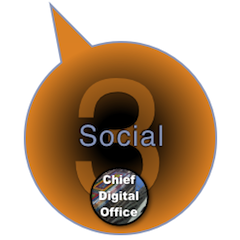
Ron May, 1956-2013
Ron May Digital Social Pioneer, and the notorious Chicago hightech commentator and analyst, died on 23 June 2013. Since I knew Ron longer and better than many people, I’ll reflect on what I knew of his life and considerable gifts and contributions. Above all, I’ll try to convey what Ron taught me about the digital world, where he was a pioneer among pioneers.
I met Ron in late 1996 in Dick Reck’s office at KPMG, when The May Report was fledging. It was obvious that he was unusually smart and passionate and motivated, and I learned that these traits were the foundation of Ron May the person. Ron May cared, and he had strong opinions. He had a brilliant inquisitive mind and indefatigable energy. I had a few conversations with Ron about his health over the years, and I suspect that it had a large impact on how he felt and interacted in public.
[…]
7 Social Business Transformation Tools provides digital executives the vital tools of online engagement, from the Social Business Life Cycle and Social Business Strategy Use Cases to the report that ranks social business advisory firms in their ability to help firms transform.

7 Social Business Transformation Tools is Part3 of the CDO Guide to Social Business for Transformation. The tools it describes encapsulate thousands of hours of hands-on experience with strategy and in-the-trenches execution work with global brands, and they explicitly address the ins and outs of people, process and technology. Part3 includes links to tools’ full versions, so CDOs can use it as a dashboard.
The Guide to Social Business for Digital Transformation helps Chief Digital Officers to understand and act on rapidly improving stakeholder relationships, productivity and business performance. The Social Business Competency Center has even more resources. The Chief Digital Office has other competency centers in Mobile, Big Data & Analytics and Ecommerce.
[…]
How to Tap the Social Business Double Value Proposition outlines an efficient and rigorous process for using social business for digital transformation in two ways: social business itself can drive reputation, preference and profit, and it’s the fastest way to develop requirements for mobile, ecommerce and big data investments.
![How to Tap the Social Business Double Value Proposition [CDO Guide to Social Business Part2]](http://rollyson.net/wp-content/uploads/2013/06/CDO_socbus_2_main2.png)
The social business double value proposition works because it discovers, engages and validates the organization’s understanding of stakeholder outcomes. Every organization’s crucial stakeholders have outcomes that they hope to attain by interacting with the organization or using its products or services. Developing deep and broad knowledge of stakeholder outcomes enables the organization to serve and quickly deepen their relationships with their stakeholders—by helping them attain their outcomes by collaborating online; moreover, since it opens fast and inexpensive communication and collaboration channels with them, it can create a continuous innovation process and sustainable advantage over rivals.
The Guide to Social Business Part2 shows how to maximize efficiency by using external and internal analyses to create and execute social business strategy, […]
TheSocial Business Enabler of Digital Transformation reveals how social technologies have changed the economics of interacting and collaborating, and it presents four ways that Chief Digital Officers can use social to lower risk and boost returns of digital transformation.
![The Social Business Enabler of Digital Transformation [CDO Guide to Social Business Part1]](http://rollyson.net/wp-content/uploads/2013/06/CDO_socbus_1_main2.png) Social business competency is pivotal to digital transformation because it combines four unusual characteristics. First, it makes interacting and collaborating an order of magnitude faster and less costly than current processes; second, few organizations understand how to use social business to interact with key customers to boost profit, so leaders enjoy rare advantage; third, when compared to ecommerce, mobile and big data & analytics investments, social business shows results quickly and costs less. Lastly, social business reveals what stakeholders really think when organizations aren’t in the room, so it’s effective for due diligence and “requirements analysis” for ecommerce, mobile and big data investments. Social business competency is pivotal to digital transformation because it combines four unusual characteristics. First, it makes interacting and collaborating an order of magnitude faster and less costly than current processes; second, few organizations understand how to use social business to interact with key customers to boost profit, so leaders enjoy rare advantage; third, when compared to ecommerce, mobile and big data & analytics investments, social business shows results quickly and costs less. Lastly, social business reveals what stakeholders really think when organizations aren’t in the room, so it’s effective for due diligence and “requirements analysis” for ecommerce, mobile and big data investments.
As Social Business Enabler of Digital Transformation explains, social business has a two-fold value proposition for Chief Digital Officers: they can use social directly to drive reputation, innovation and […]
How Social Technologies Have Disrupted Organizations is a quick overview of the business and social environment around commercial, government and nonprofit organizations that sets the context for using social business for digital transformation.
![How Social Technologies Have Disrupted Organizations [CDO Guide to Social Business Preview]](http://rollyson.net/wp-content/uploads/2013/06/CDO_socbus_pre_main2.png) [UPDATED] Social technologies are quickly changing the context around why people buy products and services. Leaders of organizations in business, government and nonprofit sectors harbor a false assumption that is becoming lethal in the digital social age: they assume that products and services have inherent value to customers and constituents. In fact, products and services represent costs to customers and revenue to producers and service providers. [UPDATED] Social technologies are quickly changing the context around why people buy products and services. Leaders of organizations in business, government and nonprofit sectors harbor a false assumption that is becoming lethal in the digital social age: they assume that products and services have inherent value to customers and constituents. In fact, products and services represent costs to customers and revenue to producers and service providers.
Customers must use products or services to create outcomes that are personally or professionally meaningful. The use of the product or service is where the customer or constituent produces value. This is why they buy. “So what,” you might be thinking. In this post I’ll show how digital social technologies are weakening mediocre products and services and how organizations can use social business to strengthen their offerings. Read a more in-depth treatment in […]
 [UPDATED] The big omni-channel trap awaits digital executives who make huge technology, process and people investments to create new “experiences” for “connected customers” but neglect social technologies’ ability to engage people emotionally. Few business executives have spent enough quality time in digital social venues to appreciate how personally and deeply people collaborate online; rather, it is normal for CDOs, CMOs and CIOs to primarily think of “digital” as mechanizing technologies like Web transaction systems (ecommerce), mobile and big data. That’s the preconception baits the big omni-channel trap. The Big Omni-Channel Trap is second in CSRA’s retail & omni-channel series, and it will show you how to avoid the trap. [UPDATED] The big omni-channel trap awaits digital executives who make huge technology, process and people investments to create new “experiences” for “connected customers” but neglect social technologies’ ability to engage people emotionally. Few business executives have spent enough quality time in digital social venues to appreciate how personally and deeply people collaborate online; rather, it is normal for CDOs, CMOs and CIOs to primarily think of “digital” as mechanizing technologies like Web transaction systems (ecommerce), mobile and big data. That’s the preconception baits the big omni-channel trap. The Big Omni-Channel Trap is second in CSRA’s retail & omni-channel series, and it will show you how to avoid the trap.
More and more customers and other stakeholders are collaborating online and getting accustomed to being individually treated like people, not demographics of consumers or customers. They like it. People can’t resist places in which they, and others around them, are listened to and responded to meaningfully. People respond to each other’s emotions. Organizations that don’t appreciate this development will invest heavily and receive lackluster returns, weakening themselves at […]
|
|



![How to Tap the Social Business Double Value Proposition [CDO Guide to Social Business Part2]](http://rollyson.net/wp-content/uploads/2013/06/CDO_socbus_2_main2.png)
![The Social Business Enabler of Digital Transformation [CDO Guide to Social Business Part1]](http://rollyson.net/wp-content/uploads/2013/06/CDO_socbus_1_main2.png) Social business competency is pivotal to digital transformation because it combines four unusual characteristics. First, it makes interacting and collaborating an order of magnitude faster and less costly than current processes; second, few organizations understand how to use social business to interact with key customers to boost profit, so leaders enjoy rare advantage; third, when compared to ecommerce, mobile and big data & analytics investments, social business shows results quickly and costs less. Lastly, social business reveals what stakeholders really think when organizations aren’t in the room, so it’s effective for due diligence and “requirements analysis” for ecommerce, mobile and big data investments.
Social business competency is pivotal to digital transformation because it combines four unusual characteristics. First, it makes interacting and collaborating an order of magnitude faster and less costly than current processes; second, few organizations understand how to use social business to interact with key customers to boost profit, so leaders enjoy rare advantage; third, when compared to ecommerce, mobile and big data & analytics investments, social business shows results quickly and costs less. Lastly, social business reveals what stakeholders really think when organizations aren’t in the room, so it’s effective for due diligence and “requirements analysis” for ecommerce, mobile and big data investments.![How Social Technologies Have Disrupted Organizations [CDO Guide to Social Business Preview]](http://rollyson.net/wp-content/uploads/2013/06/CDO_socbus_pre_main2.png) [UPDATED] Social technologies are quickly changing the context around why people buy products and services. Leaders of organizations in business, government and nonprofit sectors harbor a false assumption that is becoming lethal in the digital social age: they assume that products and services have inherent value to customers and constituents. In fact, products and services represent costs to customers and revenue to producers and service providers.
[UPDATED] Social technologies are quickly changing the context around why people buy products and services. Leaders of organizations in business, government and nonprofit sectors harbor a false assumption that is becoming lethal in the digital social age: they assume that products and services have inherent value to customers and constituents. In fact, products and services represent costs to customers and revenue to producers and service providers. [UPDATED] The big omni-channel trap awaits digital executives who make huge technology, process and people investments to create new “experiences” for “connected customers” but neglect social technologies’ ability to engage people emotionally. Few business executives have spent enough quality time in digital social venues to appreciate how personally and deeply people collaborate online; rather, it is normal for CDOs, CMOs and CIOs to primarily think of “digital” as mechanizing technologies like Web transaction systems (ecommerce), mobile and big data. That’s the preconception baits the big omni-channel trap. The Big Omni-Channel Trap is second in CSRA’s retail & omni-channel series, and it will show you how to avoid the trap.
[UPDATED] The big omni-channel trap awaits digital executives who make huge technology, process and people investments to create new “experiences” for “connected customers” but neglect social technologies’ ability to engage people emotionally. Few business executives have spent enough quality time in digital social venues to appreciate how personally and deeply people collaborate online; rather, it is normal for CDOs, CMOs and CIOs to primarily think of “digital” as mechanizing technologies like Web transaction systems (ecommerce), mobile and big data. That’s the preconception baits the big omni-channel trap. The Big Omni-Channel Trap is second in CSRA’s retail & omni-channel series, and it will show you how to avoid the trap.